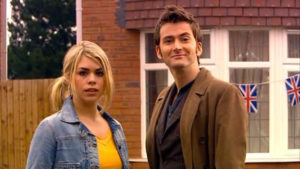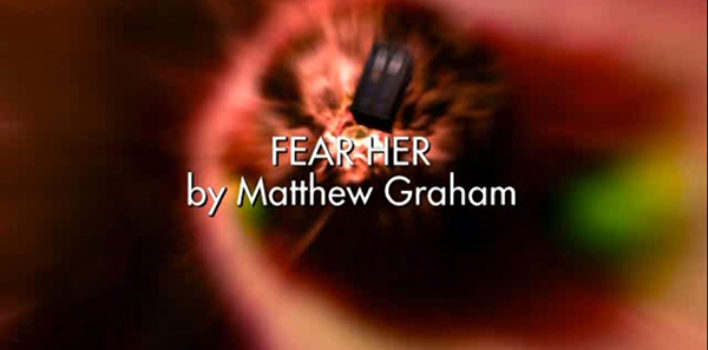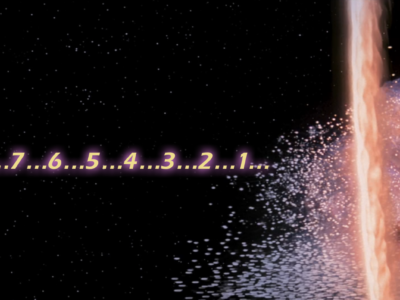Who-ology| S02E11 Fear Her
 If there’s anything the Doctor believes in, it’s companionship. Even when he finds himself without a semi-permanent traveling buddy, he is making friends with whomever he comes into contact with on his adventures.
If there’s anything the Doctor believes in, it’s companionship. Even when he finds himself without a semi-permanent traveling buddy, he is making friends with whomever he comes into contact with on his adventures.
Companionship is the centerpiece of this episode. Perhaps the title seems strange in light of that statement, but the fact is our story villain is what it suggests: fear. It is fear that keeps characters from one another—disrupting, stealing, terrorizing, and destroying community.
The Doctor: “Fear, loneliness. They’re the big ones, Rose. Some of the most terrible acts ever committed have been inspired by them. We’re not dealing with something that wants to conquer or destroy. There’s a lot of things you need to get across the universe. Warp drive, wormhole refractors. You know the thing you need most of all? You need a hand to hold.”
The setting of the story is (appropriately) the opening of the 2012 summer Olympics in London. The Olympics are one of the very few events that still bring our world together, reminding us that we are not alone, and giving opportunity and value to the ideas of unity and possibility.
The Doctor and Rose have chosen their time and place to relax a while and watch the games. They land near a residential street in Stratford where the Olympic torch will soon pass, and are quickly drawn into strange events happening in the neighborhood when missing child posters catch their eye. Though the city is abuzz with excitement for the Olympic opening ceremony, this particular street is quiet and still, the residents fearful to leave their houses or talk to one another. Their children keep vanishing into thin-air and no one can identify the cause or prevent it from happening. The Doctor and Rose pose as policeman and training cadet to investigate the issue.
It turns out that the problem of the missing children emanates from an actual child: one who is misusing its innate yearning for companionship. A young Isolus (a powerful, empathic, flower-like creature) was accidentally separated from its millions of siblings and has drifted alone to the earth. It is drawn to the loneliness of a young girl named Chloe who lives in the Stratford housing estate and, seeking to fill the void left by its lost family, possesses her.
 Things run amuck when the Isolus’ power is combined with its immaturity and Chloe’s in tandem. They draw pictures that steal living beings (ie: the missing kids) and trap them in drawings that hang on Chloe’s bedroom wall. Together, their loneliness becomes a monster, reaching out and sucking people into it without satiation. The Isolus-posessed-Chloe is on the verge of imprisoning the whole planet in its search for companionship unless it is stopped. The solution is for the Doctor and Rose to send the Isolus home; nothing on earth can slake its thirst for connection.
Things run amuck when the Isolus’ power is combined with its immaturity and Chloe’s in tandem. They draw pictures that steal living beings (ie: the missing kids) and trap them in drawings that hang on Chloe’s bedroom wall. Together, their loneliness becomes a monster, reaching out and sucking people into it without satiation. The Isolus-posessed-Chloe is on the verge of imprisoning the whole planet in its search for companionship unless it is stopped. The solution is for the Doctor and Rose to send the Isolus home; nothing on earth can slake its thirst for connection.
The Doctor: “The Isolus Mother, drifting in deep space. See, she jettisons millions of fledgling spores. Her children. The Isolus are empathic beings of intense emotions, but when they’re cast off form their mother, their empathic link, their need for each other, is what sustains them. They need to be together. They cannot be alone.”
Although it seems most of us spend our lives trying to prove otherwise, our need for community is not so different from the Isolus’. We were made in the image of a communal being—the Trinitarian God (1)—and it is an essential part of our nature. We are fragmented beings, made whole only by our connections to other humans and to God. There is a great metaphor in the Bible that shows what it looks like when the people of God accept and live into this reality:
“The way God designed our bodies is a model for understanding our lives together as a church: every part dependent on every other part, the parts we mention and the parts we don’t, the parts we see and the parts we don’t. If one part hurts, every other part is involved in the hurt, and in the healing. If one part flourishes, every other part enters into the exuberance. You are Christ’s body—that’s who you are! You must never forget this. Only as you accept your part of that body does your ‘part’ mean anything” -1 Corinthians 12:12-31)
As the title suggests, we watch as fear keeps people from community. The Stratford residents have a common problem but fear isolates them from one another; Chloe’s mother is afraid to talk to her about traumatic events in their lives, causing a rift between them that makes Chloe feel alone. The Isolus child understands the gravity of being connected to a larger whole, but is so afraid of being alone that it drags people towards itself—creating a “false” community that does not satisfy because it is not voluntary or true.
 Fear does the same to us. Fear of being vulnerable, of being out of control, of becoming dependent on others, of being accepted and then somehow losing that connection: these fears, among others, keep us from fully committing ourselves to community. Connection to others causes us to learn and grow; it shows us truths about our universe, about God, that we cannot devise on our own; it helps us to see ourselves for what we really are, the good and the bad. Community is imperfect—the Church is no exception. But though we most certainly will experience hurt from community, so much greater are our losses when we choose not to be connected.
Fear does the same to us. Fear of being vulnerable, of being out of control, of becoming dependent on others, of being accepted and then somehow losing that connection: these fears, among others, keep us from fully committing ourselves to community. Connection to others causes us to learn and grow; it shows us truths about our universe, about God, that we cannot devise on our own; it helps us to see ourselves for what we really are, the good and the bad. Community is imperfect—the Church is no exception. But though we most certainly will experience hurt from community, so much greater are our losses when we choose not to be connected.
The Doctor and Rose are able to send the Isolus child back into space where it can reconnect with the community of which it was meant to be a part. Whether or not it understands what has happened to it, we learn through its story that we cannot fill our need for connection with anything less than true community; putting anything else in its place—money, power, success, possessions—will only make us feel more isolated and empty. And at the end of the story, we also learn alongside Chloe and her mother that we are stronger when we face life together, communicating and standing as one body, taking advantage of others’ gifts or wisdom, and filling their weaknesses with our own strengths.
1 The Gospel writer John describes the Son as living from all eternity in the ”bosom of the Father” (John 1:18), an ancient metaphor for love and intimacy. Later in John’s Gospel, Jesus, the Son, describes the Spirit as living to ”glorify” him (John 16:14). In turn, the Son glorifies the Father (17:4) and the Father, the Son (17:5). This has been going on for all eternity (17:5b).
What does the term ”glorify” mean? To glorify something or someone is to praise, enjoy and delight in them. When something is useful you are attracted to it for what it can bring you or do for you. But if it is beautiful, then you enjoy it simply for what it is. Just being in its presence is its own reward. To glorify someone is also to serve or defer to him or her. Instead of sacrificing their interests to make yourself happy, you sacrifice your interests to make them happy. Why? Your ultimate joy is to see them in joy.
What does it mean, then, that the Father, Son and Holy Spirit glorify one another? If we think of it graphically, we could say that self-centeredness is to be stationary, static. In self-centeredness we demand that others orbit around us. We will do things and give affection to others, as long as it helps us meet our personal goals and fulfills us.
The inner life of the triune God, however, is utterly different. The life of the Trinity is characterized not by self-centeredness but by mutually self-giving love. When we delight and serve someone else, we enter into a dynamic orbit around him or her, we centre on the interests and desires of the other. That creates a dance, particularly if there are three persons, each of whom moves around the other two. So it is, the Bible tells us. Each of the divine persons centers upon the others. None demands that the others revolve around him. Each voluntarily circles the other two, pouring love, delight and adoration into them. Each person of the Trinity loves, adores, defers to and rejoices in the others. That creates a dynamic, pulsating dance of joy and love. The early leaders of the Greek church had a word for this – perichoresis. Notice the root of our word ””choreography”” within it. It means literally to ””dance or flow around””.
Timothy J. Keller, The Reason for God, pp. 214-216







